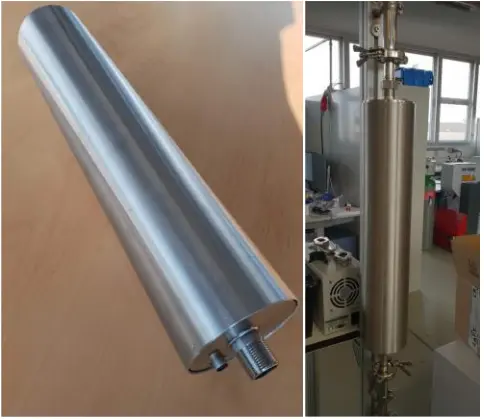Development of a Tubular Resonator Sensor Platform for Inline Process Fluid Monitoring
Monitoring fluid properties such as viscosity is crucial in many industrial processes. For sanitary processes, cleanability is a crucial factor. A tubular non-intrusive resonant sensor was developed to measure the viscosity in the process line, avoiding any flow obstructions and being cleanable in place using industry-standard processes. To develop these sensors, a comprehensive, scalable model was developed to describe the fluid-structure interaction of the fluid with the resonator.
In this study, a tubular torsional resonator was developed. Its resonance was driven and sensed using electromagnetic transducers. The operating principle of the sensor is based on the excitation of a torsional mode, and subsequent measurement of the resonant response. The damping and the resonance frequency are determined from the response signal. The resonance frequency and damping are then related to the fluid’s viscosity. A comprehensive numerical model of a tubular resonator has been developed and validated. The sensor used for the validation study had an inner diameter of 5.25 mm. For most industrial processes, larger tube diameters are required. Therefore, using the previously validated models, a larger version of a functionally similar sensor was built and tested. The larger resonator was based on a 20 mm inner diameter tube. The sensor was calibrated, and the calibration was verified, using a series of NIST traceable viscosity reference fluids. The sensor measured the fluid’s viscosity-density product over a wide range from 1 to 100’000 mPa. The measured values of the bandwidth divided by the resonance frequency (Γ/f0) were in good agreement with the predictions of the numerical model, showing the utility of the model as a development tool for scaling to larger diameter tubes.

